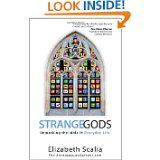
To join the discussion about StrangeGods, Unmasking the Idols in Everyday Life, or to order a copy, go here.
I’m going to suggest that my book club read StrangeGods, Unmasking the Idols in Everyday Life for its July discussion.
The reason is simple. Author Elizabeth Scalia has written a book that is so thought-provoking it makes me want to sit down with her and talk about it. I think my book club members will feel the same way.
StrangeGods unmasks both the meaning of our personal idolatries and the way we spiral deep and deeper into worshipping them until all perspective and thought are lost to them.
Idols and idolatry violate the First and greatest Commandment. When we put anything in our lives as the center of our thinking and make that the touchstone of our values and the object of our desires, we have created an idol. The extent that we allow this idol to become the center of who and what we are reflects directly the depth of our idolatry.
Jesus told us, “You can not serve two masters.” You cannot serve two gods. You can not follow the real God and also an idol of your own devising at the same time.
That, at root is what is wrong with idols and idolatry. They are placebo gods for the real God, and like all placebos, they only appear to have power in the imaginations of our minds.
Elizabeth understands that we can have big idols and little idols. We can and do make an idol of almost anything. I would say that in an odd fashion, I make a idol of food because I reach for it to find comfort. I sooth myself with food like a monkey, rocking in place with its tail wrapped around it, is soothed by the motion of rocking back and forth.
In that sense, food, for me, is an idol of sorts. It’s not the intellectual idol that politics or commitment to a cause can become. But it is something I use to deal with my troubles instead of turning to God with them.
That’s the core of idolatry. It is a substitute for God, the real God.
StrangeGods makes the point that many of our idols are, like my use of food, strange indeed. Our obsessions quickly become our idols, as do our compulsions. All these little idols, each of which begins with our self-referencing self-absorption and moves outward to an unhealthy focus on things, actions and ideas, are an expression of isolation. Me first is ultimately and always me only.
Whether you waste time, money and health on unneeded food, or you isolate in front of a computer or make some idea or plan or ambition the center of who you are, you are always at root isolating yourself on an island of me first. The seminal idol is always ourselves. All the rest flows from that.
StrangeGods leads us from a discussion of the many ways and many things we substitute for God in our lives to the really egregious mental addictions of what Elizabeth call “Super Idols.” Super Idols are the overarching idols that become ideologies, philosophies and ultimately, world views.
We see them and their damage all about us. As our society has moved more and more from a God-centered world view to a me-centered world view it has shattered and divided along the fault lines of our selfish desires. We dress these things up and call them “rights” or “causes.” We label ourselves along the divisions we create to separate ourselves from our brothers and sisters, but in reality these things are all lies. They are just idolatry spread large and become organized into the false religions of political and social movements.
I know something about this. I’ve practiced this form of idolatry and I deal with its practitioners on a daily basis. There is no person so indifferent to the consequences of their actions to their country, other people, or even themselves as someone who is in the grip of a super idolatrous false social religion.
These people have checked both their brains and their hearts at the altar of their super idol and they are fueled by the twin evils of unthinking rage and self-righteousness that super idols pump into them. They’re dangerous. They’re destructive. And they are mean and cold-hearted to a level that their saner selves would find abhorrent.
As you can see, StrangeGods is a thought-provoking book that leads you to find yourself on most of its pages. It is a convicting and inspiring read in that it convicts you of the idolatries in your own life and it also inspires you to repent of these sins of false idol worship and turn back to the real God.
In the end, we turn to false idols because they are comforting reflections of us. They don’t appear to ask the difficult things of us that relationships with an other always does. Idols seem easy and comprehensible because at root they are ourselves.
But you cannot serve two masters. You cannot follow false gods and the real God simultaneously. You have to chose, and given our proclivity for self-referencing you have to make this choice many times in a single day. Banish the little gods and you will spare yourself the true evil of the super idols that take your mind and your goodness away from you.
I heartily recommend StrangeGods, Unmasking the Idols in Everyday Life. It is that rare thing: A book that can make you want to be and do better.
















